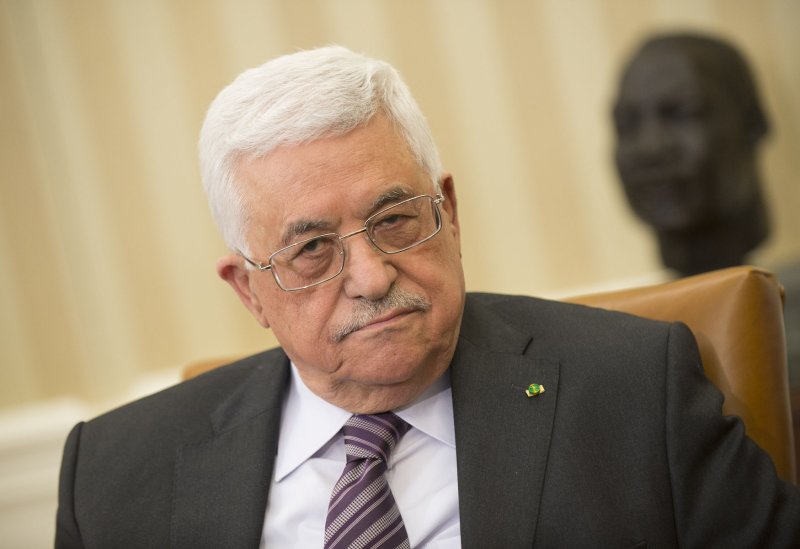WASHINGTON, April 8 (UPI) -- Israeli Prime Minister Netanyahu and his Palestinian interlocutor President Mahmoud Abbas, most pundits say, are now the main obstacles to peace as neither one is politically strong enough to make the required concessions. Wrong.
The roadblock to peace is clearly marked. It’s Quincy Magoo, the protagonist of a cartoon series, an old man whose most notable trait is myopia close to blindness. His stubborn refusal to admit having a problem translates into a refusal, bordering on paralysis, to wear glasses.
Magoo is so stubborn about everything that when he realizes the truth of what he is experiencing he will still keep his specs hidden from all but himself.
This, in turn, leads to ludicrous situations -- like the Mideast peace process. Thousands write about it all over the world, but facts are still hard to come by.
Netanyahu knows that if he concedes an independent Palestinian state in the West Bank, Abbas, now nearing the end of his political career, will be pushed aside by Hamas, the extremist group now ruling the Gaza strip that already commands the loyalty of a majority of Palestinians in the West Bank.
Such a Hamas-controlled regime in charge of the West Bank would then have the ultimate prize in its sights: a new western frontier of Palestine on the Mediterranean Sea.
For many Israelis, it’s the Masada complex, the 1,300-foot cliffs on the eastern edge of the Judean desert overlooking the Dead Sea, where 960 Jewish rebels committed suicide by stabbing themselves in 74 AD to avoid surrender to the Romans.
The only way for Israel to avoid the oubliette of history is to make sure Hamas never inherits the West Bank as a Palestinian state.
This is done by stepping up Israeli settlements in the West Bank and East Jerusalem -- all in violation of the 1967 armistice. Fifty-five percent of the Israeli Lands Authority’s most recent published tenders are for 3,059 residential units in the West Bank and East Jerusalem, which Palestinians demand Israel recognize as their capital.
There are now half a million Israelis settled in the West Bank and East Jerusalem with a network of modern roads Palestinians are not allowed to use. In the latest Palestinian retaliatory action, President Abbas signed his government on to 15 international conventions and agreements.
What U.S. Secretary of State John Kerry hoped to achieve after 12 roundtrips to the Middle East in almost as many weeks is not clear -- though his ardor cooled perceptibly as he made clear he was not going for a 13th. April 29 marks the end of the nth time period for negotiations between Israel and the Palestinian Authority.
The PA still stubbornly refuses to recognize Israel as a Jewish state and negotiations are at the proverbial impasse. President Abbas even talks of martyrdom for the sake of Jerusalem. His position still clings to the pre-1967 war borders with limited land swaps and the deployment of foreign peacekeeping forces, such as NATO contingents.
When speaking to foreign reporters, Abbas sticks to a demilitarized West Bank. And when addressing Palestinians, he makes clear he is demanding a totally demilitarized state “without leaving a single Israeli soldier behind.”
With a civil war next door in Syria, now in its 4th year, which has claimed 160,000 lives and driven 2 million into exile in neighboring countries (one in four inhabitants in Lebanon is now a homeless Syrian), Netanyahu would rather incur the wrath of “apartheid” in the West Bank than surrender to Palestinian “terrorists.”
Meanwhile, Israel’s illegal expansion of Jewish settlements in the West Bank and East Jerusalem continues at the rate of several houses and apartments per week.
Iran, as assessed from Israel, has not shut down its covert nuclear weapons program. It has also dispatched to the U.N. in New York as its new permanent representative one of Iran’s most strident anti-U.S. and anti-Israel voices: Hamid Aboutalebi. He was part of the “student” movement that took over the U.S. Embassy in Tehran in 1979 and held all U.S. personnel captive for 444 days -- until Ronald Reagan was sworn in as President.
Hanging over the entire Middle East is the specter of U.S. isolationist sentiment following two trillion dollar geopolitical mistakes in Iraq and Afghanistan.
“The U.S.’ success as a hegemon has traditionally been about magnifying its power through friendship,” wrote the Financial Times’ Edward Luce. “Yet its ability to rally existing friends behind it and make new ones to replace them is diminishing.”
Vladimir Putin’s annexation of Crimea triggered hand wringing and little else. Editorial commentaries began questioning -- a generation late -- the expansion of NATO up against Russia’s borders, instead, as some suggested at the time, of inviting Russia to join NATO as the nation that shed the evil Soviet Union.
The lack of Western resolve appears to have sharpened Putin’s geopolitical appetite. The Russian-speaking half of Ukraine, already the scene of staged pro-Russian demos and bloody clashes, appears to be next on Putin’s hit parade.
NEWSMAX, the conservative monthly, put Putin on its April cover, walking briskly from inspecting a fighter-bomber. The cover caption: “Vladimir Putin’s New Cold War -- By John Bolton.” For many conservatives on the hard right, the Cold War never ended.
The Baltic nations are members of NATO but isolated and nervous. What would happen if Russia moved back into one of them or all three? Officially, the U.S. and its allies would have to treat such an attack as tantamount to an invasion of Germany or France. And the world would be on the verge of World War III.
In the flush of victory, post-Cold War policies were not thought through too carefully.















